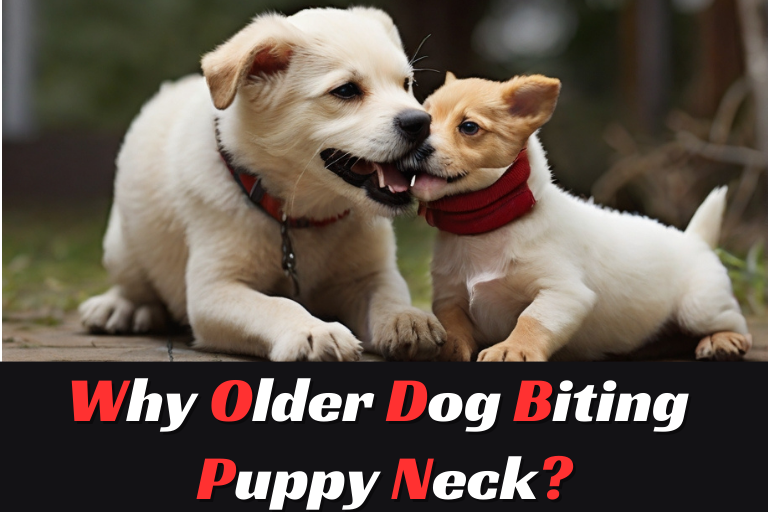Table of Contents
ToggleWhy Older Dog Biting Puppy Neck?
Let’s understand Why Older Dog Biting Puppy Neck.
Introduction
When we bring a new puppy into our homes, we expect them to get along with our older dogs and become fast friends.
However, it’s not uncommon for owners to witness their older dogs biting the necks of puppies, which can be concerning and confusing.
In this article, we’ll delve into why older dogs engage in this behavior and how to manage it effectively.
Socialization and Pack Hierarchy

Dogs are pack animals by nature, and they often establish hierarchies within their groups.
When a new puppy joins the pack, older dogs may resort to biting their necks as a way to establish dominance or assert their position within the group.
This behavior is rooted in their instincts and natural pack dynamics.
Communication and Correction
Older dogs use neck biting as a form of communication and correction with puppies. By gently biting the puppy’s neck, they mimic the behavior of adult dogs teaching younger members proper manners and boundaries.
In many cases, this behavior is a way for older dogs to teach puppies how to behave appropriately within the pack.
Play Behavior vs. Aggression

It’s essential to differentiate between playful neck biting and aggressive behavior in older dogs.
Playful neck biting is often accompanied by other friendly gestures, such as wagging tails and relaxed body language.
On the other hand, aggressive neck biting may involve growling, snapping, or other signs of hostility.
Risks and Dangers
While neck biting is a natural behavior for dogs, it can pose risks and dangers, especially if the older dog becomes too rough with the puppy.
Excessive or aggressive neck biting can lead to injury, trauma, or behavioral issues in puppies. It’s crucial for owners to monitor these interactions closely and intervene if necessary.
Management and Training

To manage and prevent excessive neck biting behavior in older dogs, owners can employ several strategies and techniques.
Providing plenty of opportunities for positive socialization, setting clear boundaries, and redirecting the older dog’s attention to appropriate toys or activities can help curb unwanted behavior.
Positive Reinforcement
Positive reinforcement training methods, such as rewarding desired behaviors with treats or praise, can be highly effective in teaching older dogs alternative behaviors.
By reinforcing positive interactions and gently correcting unwanted behavior, owners can encourage their older dogs to interact with puppies more gently and respectfully.
Seeking Professional Help

In some cases, managing older dogs biting puppy necks may require the assistance of a professional dog trainer or behaviorist.
These experts can assess the situation, provide personalized guidance, and develop a training plan tailored to the specific needs of the dogs involved. Don’t hesitate to seek help if you’re struggling to address this behavior on your own.
Conclusion
In conclusion, older dogs biting puppy necks is a behavior rooted in natural instincts and pack dynamics.
While it can be concerning for owners to witness, understanding the reasons behind this behavior and employing effective management and training techniques can help foster positive interactions between older dogs and puppies.
By providing a safe and nurturing environment, owners can ensure that their dogs develop healthy relationships and behaviors that last a lifetime.
FAQs
Here are some FAQs related to Older Dog Biting Puppy Neck:
1. Is it normal for older dogs to bite puppy necks?
Yes, it’s a natural behavior rooted in pack dynamics and communication. However, it’s essential to monitor these interactions to ensure they remain safe and appropriate.
2. How can I tell if the neck biting is playful or aggressive?
Playful neck biting is usually accompanied by friendly gestures and relaxed body language, while aggressive behavior may involve growling, snapping, or stiff body posture.
3. Should I intervene when I see my older dog biting a puppy’s neck?
If the interaction appears to be getting too rough or aggressive, it’s advisable to intervene calmly and redirect their attention to more appropriate activities.
4. Will my puppy be traumatized by the older dog’s neck biting?
While some puppies may find rough play distressing, most will quickly bounce back and continue to engage with the older dog. However, if you notice signs of fear or anxiety, it’s essential to provide comfort and reassurance to your puppy.
5. When should I seek professional help for this behavior?
If you’re unable to manage or correct the behavior on your own, or if you’re concerned about the safety of your dogs, don’t hesitate to consult with a professional dog trainer or behaviorist for guidance and support.
Related Posts :
- Let’s Understand: Why Westies Are the Worst in 2024?
- Let’s Understand Why Schnauzers Are the Worst Dogs in 2024
- Let’s understand Is Pura Safe for Cats?

